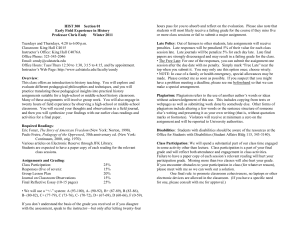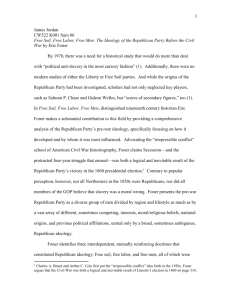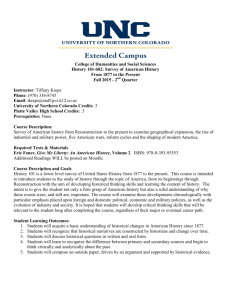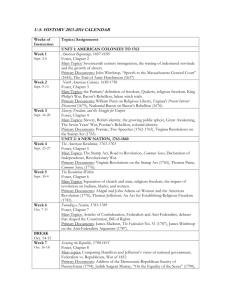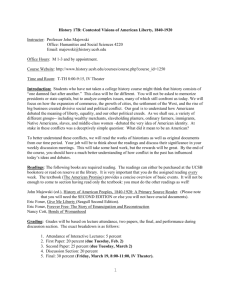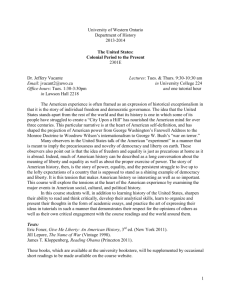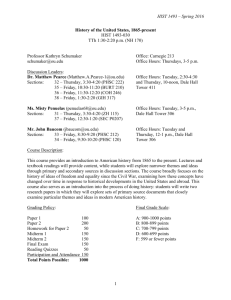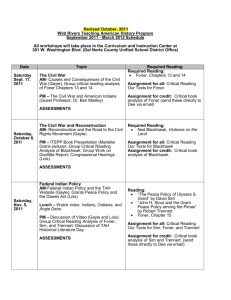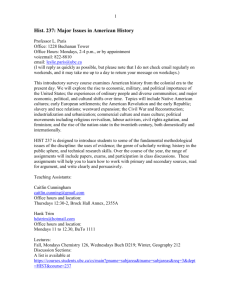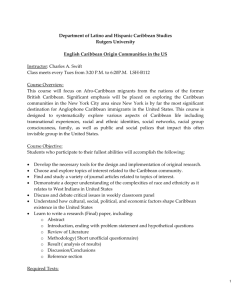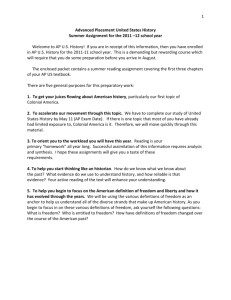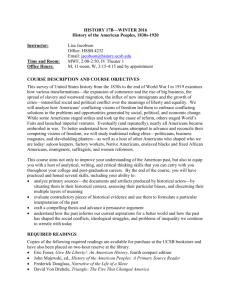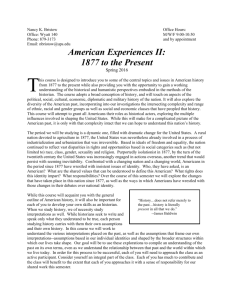History 201, syllabus 2010
advertisement
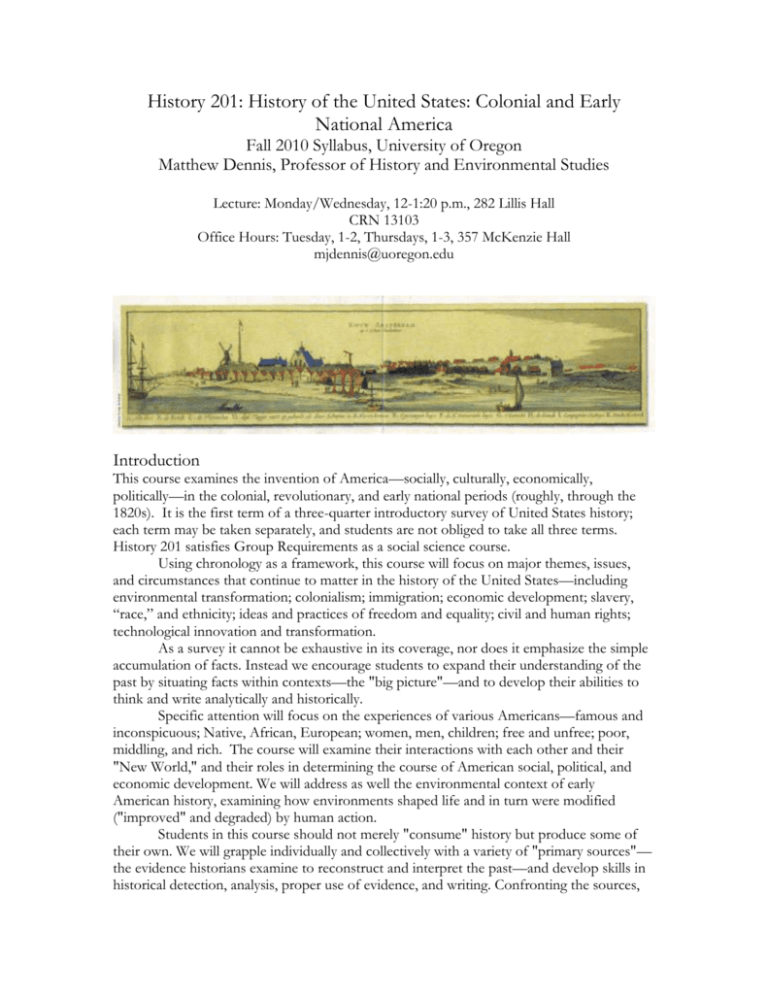
History 201: History of the United States: Colonial and Early National America Fall 2010 Syllabus, University of Oregon Matthew Dennis, Professor of History and Environmental Studies Lecture: Monday/Wednesday, 12-1:20 p.m., 282 Lillis Hall CRN 13103 Office Hours: Tuesday, 1-2, Thursdays, 1-3, 357 McKenzie Hall mjdennis@uoregon.edu Introduction This course examines the invention of America—socially, culturally, economically, politically—in the colonial, revolutionary, and early national periods (roughly, through the 1820s). It is the first term of a three-quarter introductory survey of United States history; each term may be taken separately, and students are not obliged to take all three terms. History 201 satisfies Group Requirements as a social science course. Using chronology as a framework, this course will focus on major themes, issues, and circumstances that continue to matter in the history of the United States—including environmental transformation; colonialism; immigration; economic development; slavery, “race,” and ethnicity; ideas and practices of freedom and equality; civil and human rights; technological innovation and transformation. As a survey it cannot be exhaustive in its coverage, nor does it emphasize the simple accumulation of facts. Instead we encourage students to expand their understanding of the past by situating facts within contexts—the "big picture"—and to develop their abilities to think and write analytically and historically. Specific attention will focus on the experiences of various Americans—famous and inconspicuous; Native, African, European; women, men, children; free and unfree; poor, middling, and rich. The course will examine their interactions with each other and their "New World," and their roles in determining the course of American social, political, and economic development. We will address as well the environmental context of early American history, examining how environments shaped life and in turn were modified ("improved" and degraded) by human action. Students in this course should not merely "consume" history but produce some of their own. We will grapple individually and collectively with a variety of "primary sources"— the evidence historians examine to reconstruct and interpret the past—and develop skills in historical detection, analysis, proper use of evidence, and writing. Confronting the sources, History 201, Fall 2010 2 students should learn not only about the early American past but how history is constructed by historians. Course Format and Requirements This class will meet for lectures twice weekly. In addition, each student is required to enroll in a discussion group that meets for one hour every week. Although lectures, readings, and discussions are carefully coordinated, each will introduce material not available elsewhere. Therefore, attendance at lectures and discussion sessions, and careful reading of all assignments, is crucial to success in the course. Attendance is mandatory and will be taken at weekly discussion sessions. These sessions are particularly important: they provide an opportunity to clarify and respond to issues raised in lectures and readings; they are the setting for fully participatory discussion and debate; and they are students' best source of information and guidance on practical matters, such as papers and tests. Students should also be aware that this course will utilize the web to communicate information and assignments through the Blackboard website; in addition, through Blackboard, instructors might employ discussion boards and require submission of short assignments. Every student will need to access the Blackboard site throughout the term: https://blackboard.uoregon.edu/ The History 201 Blackboard site will grow and change throughout the term and should be consulted regularly to get up-to-date information, course materials, and assignments. Laptop computers and other electronic devices are not allowed in class. Please take notes the old-fashioned way—with pen or pencil—and please do not send or receive text messages or use phones during class. If you have a documented disability that requires you to use a computer in class, please see me for approval. Requirements Students' grades will be based on their performance on the following: Two short papers (20% and 25%: 45% total). An in-class mid-term exam (20%). A final exam (25%). Quality of performance in discussion sections (10%). Students must submit all assigned work in order to pass the course. Failure to submit all required work will earn a failing grade. Papers Information on papers will be available through discussion leaders and posted on the course website under Assignments on Blackboard. Exams Both the mid-term and final exams will be "blue book" essay tests, requiring students to formulate clear, convincing positions or arguments that engage the large questions posed. In these exams, students should present their arguments systematically and support them with specific evidence drawn from lectures, discussions, and reading assignments. Specific History 201, Fall 2010 3 information about each exam will be available through discussion leaders and posted on the course website as they approach. Required Readings The books listed below are required reading. They are available in paper editions at the UO Bookstore. They are also on reserve in the Knight Library. In addition, some required reading and visual materials will be available only through the Blackboard website. Eric Foner, Give Me Liberty! An American History, vol. 1 (New York: W.W. Norton, 2d Seagull Edition, 2009). Eric Foner, ed., Voice of Freedom: A Documentary History, vol. 1 (New York: W.W. Norton, 2d ed., 2008). Note: You may substitute the first edition of either book (which might be available more cheaply as a used copy). Please see your instructor for an adjusted list of readings. These readings are designed to complement—not simply to overlap with—the lectures. They provide the raw material for producing historical knowledge in lectures, discussions, exams, and papers. Students should complete each week's readings during the week listed on the syllabus. Students will be expected to have completed their weekly reading assignments in preparation for their discussion session meetings each week. Academic Integrity University of Oregon students are held to the standards of the Student Conduct Code. Acts of academic dishonesty, cheating, and plagiarism will not be tolerated and will be referred to the Office of Student Judicial Affairs. All work submitted by students must be their own, written for this course. Acts of plagiarism and academic dishonesty can result in failure of the course and expulsion from the University. Students with Disabilities We will make every effort to accommodate students with disabilities. If you have a documented disability and anticipate needing accommodations in this course, please make arrangements to meet with the instructor as soon as possible. Please request that the Counselor for Students with Disabilities send a letter verifying your disability. Lecture, Reading, and Assignments Schedule Week 1: Introduction; Before Columbus and Early American Encounters. September 27: Introduction. The Weirdness of Early America. What is (American) history? September 29: Before 1492, Colonialism, and Columbian Exchange. Read Give Me Liberty! (Foner textbook), preface and chapter 1 (pp. xxiii-xxx; 1-42); Voices of Freedom (Foner documents): Las Casas, de Brébeuf, Micmac, pp. 10-13, 17-24. Week 2: Colonial Beachheads. October 4: The Chesapeake: “Looking Out for No. 1.” October 6: New England: A Bible Commonwealth? Read Foner text, chapter 2, 43-84; Foner documents: Hakluyt, women to Virginia, indentured servant, Maryland Act, Winthrop, Hutchinson trial, 25-42. On Blackboard (see History 201, Fall 2010 4 Course Documents, week 2): letter of Richard Frethorne to his parents (1623); letter of John Pond to his parents (1631). Week 3: Settlement and Unsettlement. October 11: Middle Colonies and Borderlands Paper 1 due in week 3 discussion sections. October 13: Witch-hunting and Crisis in New England. Read Foner text, chapter 3, 85-124; Foner documents: New York charter, Penn, immigrant letter, Mittelberger, Carolina women, 49- 56, 61-66, 68-69; also: excerpts from witchcraft trial records (examinations of Rebecca Nurse, Reversal of Attainder, confession of Ann Putnam) on Blackboard (see Course Documents, week 3). Week 4: Servitude, Slavery, Cultures of Resistance. October 18: Unfree Labor and the Origins of Slavery in Early America—Why Slavery? October 20: Slavery and an African American Culture of Resistance. Read Foner text, chapter 4 to p. 140 (125-40); Foner documents: Complaints of indentured servant, Equiano, slavery conspiracy, 66-68, 70-77; read also Falconbridge, Beverly, Virginia statutes, and runaway slave notices on Blackboard (in Course Documents, week 4). Week 5: Eighteenth-Century Turmoil and Transformation. October 25: What is Truth? Reason and Revelation, Enlightenment and Awakening. October 27: Midterm Examination. Read Foner text, remainder of chapter 4 (140-66); Foner documents: Zenger trial, Whitefield defense, Pontiac, 81-89. Week 6: America in Revolt. November 1: Imperial Crisis and the Movement for Independence—Why Revolution? November 3: War for Independence—How did the Rebels Win? Read Foner text, chapter 5, 167-200; Foner documents: Independent Reflector, Virginia Resolutions, Regulator petition, Sons of Liberty, Farmington petition, Paine, 78-81, 90-108; Declaration of Independence (in Foner text, appendix A9-A12). Week 7: Revolutionary Settlement. November 8: Revolution Within—How Revolutionary was the Revolution? November 10: Confederation and Constitution—What Sort of Democratic Republic? Read Foner, chapters 6 & 7, 201-67; Foner documents: Abigail Adams, “Free Suffrage,” Jefferson on religious liberty, Webster, Indentured Servants, slaves’ petition, Federalist 51, Anti-Federalist, Judith Sargent Murray, 111-25, 132-39, 154-58; U.S. Constitution (in Foner text appendix, A13-A28). Week 8: A More Perfect Union? November 15: Slavery and Emancipation—Constructing American Democracy? Paper 2 due in week 8 discussion sections. November 17: The West: Expansion, American Indians, and an “Empire for Liberty”? Read Foner text, chapter 8, 268-301; see also pp. 365-69 from chapter 10 on the Cherokee Removal controversy; Foner documents: Pennsylvania Act for Gradual Abolition, Ohio History 201, Fall 2010 5 petition, July 4th oration, Jefferson on race and slavery, Tucker, Tecumseh, Sharitarish, Cherokee Nation Appeal, Frederick Douglass, 125-32, 139-46, 164-68, 204-209, 213-16. Week 9: Early National Transformations. November 22: Incorporation of America: Commercial Revolution, Early Industrialization November 24: Thanksgiving, History, and American Identity. Thanksgiving Holiday, November 25-26 Read Foner text, chapter 9, 302-37; Foner documents: Baker, arrival of immigrants, Emerson, Thoreau, Finney, Brownson, Cotton Kingdom, 171-92, 216-18. Week 10: Early National Transformations. November 29: Work, Class, and Reform in the Early Republic. December 1: Conclusion: “Democracy in America.” Read Foner text, chapter 10 through p. 359 (338-59), and the beginning of chapter 12, through p. 422 (409-22); Foner documents: Robert Owen, Philip Schaff, The Liberator, Seneca Falls Declaration, 237-47, 261-64. Final Examination: Thursday, December 9, 10: 15 a.m.
